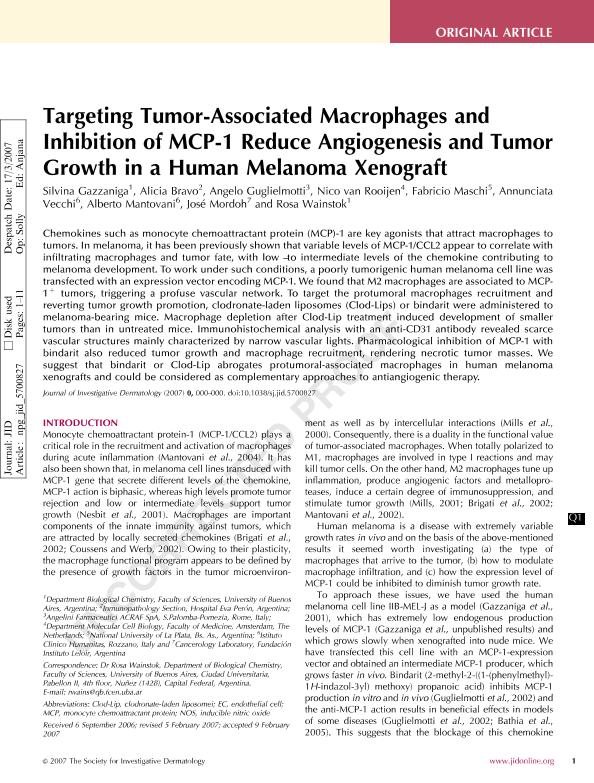Artículo
Targeting Tumor-Associated Macrophages and Inhibition of MCP-1 Reduce Angiogenesis and Tumor Growth in a Human Melanoma Xenograft
Gazzaniga, Silvina Noemí ; Bravo, Alicia I.; Guglielmotti, Angelo; Rooijen, Nico van; Maschi, Fabricio; Vecchi, Annunciata; Mantovani, Alberto; Mordoh, Jose
; Bravo, Alicia I.; Guglielmotti, Angelo; Rooijen, Nico van; Maschi, Fabricio; Vecchi, Annunciata; Mantovani, Alberto; Mordoh, Jose ; Wainstok, Rosa
; Wainstok, Rosa
 ; Bravo, Alicia I.; Guglielmotti, Angelo; Rooijen, Nico van; Maschi, Fabricio; Vecchi, Annunciata; Mantovani, Alberto; Mordoh, Jose
; Bravo, Alicia I.; Guglielmotti, Angelo; Rooijen, Nico van; Maschi, Fabricio; Vecchi, Annunciata; Mantovani, Alberto; Mordoh, Jose ; Wainstok, Rosa
; Wainstok, Rosa
Fecha de publicación:
2007
Editorial:
Elsevier
Revista:
Journal Of Investigative Dermatology
ISSN:
0022-202X
Idioma:
Inglés
Tipo de recurso:
Artículo publicado
Clasificación temática:
Resumen
Chemokines such as monocyte chemoattractant protein (MCP)-1 are key agonists that attract macrophages to tumors. In melanoma, it has been previously shown that variable levels of MCP-1/CCL2 appear to correlate with infiltrating macrophages and tumor fate, with low to intermediate levels of the chemokine contributing to melanoma development. To work under such conditions, a poorly tumorigenic human melanoma cell line was transfected with an expression vector encoding MCP-1. We found that M2 macrophages are associated to MCP-1+ tumors, triggering a profuse vascular network. To target the protumoral macrophages recruitment and reverting tumor growth promotion, clodronate-laden liposomes (Clod-Lip) or bindarit were administered to melanoma-bearing mice. Macrophage depletion after Clod-Lip treatment induced development of smaller tumors than in untreated mice. Immunohistochemical analysis with an anti-CD31 antibody revealed scarce vascular structures mainly characterized by narrow vascular lights. Pharmacological inhibition of MCP-1 with bindarit also reduced tumor growth and macrophage recruitment, rendering necrotic tumor masses. We suggest that bindarit or Clod-Lip abrogates protumoral-associated macrophages in human melanoma xenografts and could be considered as complementary approaches to antiangiogenic therapy.
Archivos asociados
Licencia
Identificadores
Colecciones
Articulos(IIBBA)
Articulos de INST.DE INVEST.BIOQUIMICAS DE BS.AS(I)
Articulos de INST.DE INVEST.BIOQUIMICAS DE BS.AS(I)
Articulos(IQUIBICEN)
Articulos de INSTITUTO DE QUIMICA BIOLOGICA DE LA FACULTAD DE CS. EXACTAS Y NATURALES
Articulos de INSTITUTO DE QUIMICA BIOLOGICA DE LA FACULTAD DE CS. EXACTAS Y NATURALES
Citación
Gazzaniga, Silvina Noemí; Bravo, Alicia I.; Guglielmotti, Angelo; Rooijen, Nico van; Maschi, Fabricio; et al.; Targeting Tumor-Associated Macrophages and Inhibition of MCP-1 Reduce Angiogenesis and Tumor Growth in a Human Melanoma Xenograft; Elsevier; Journal Of Investigative Dermatology; 127; 8; 2007; 2031-2041
Compartir
Altmétricas



